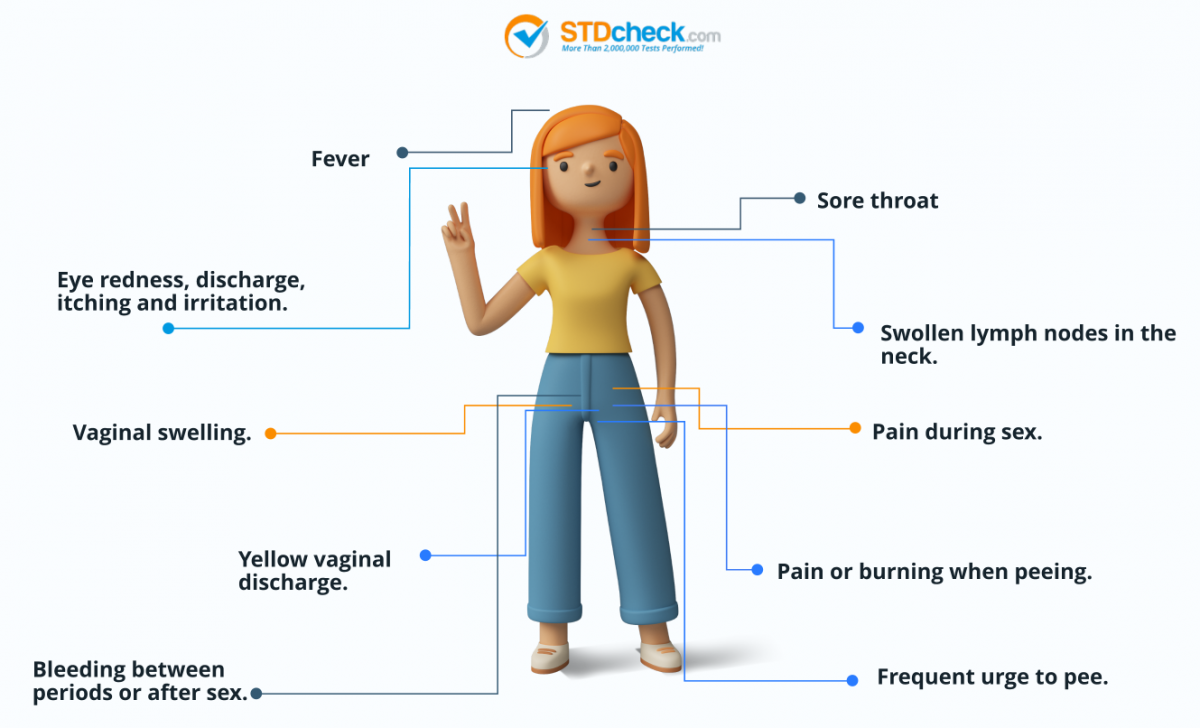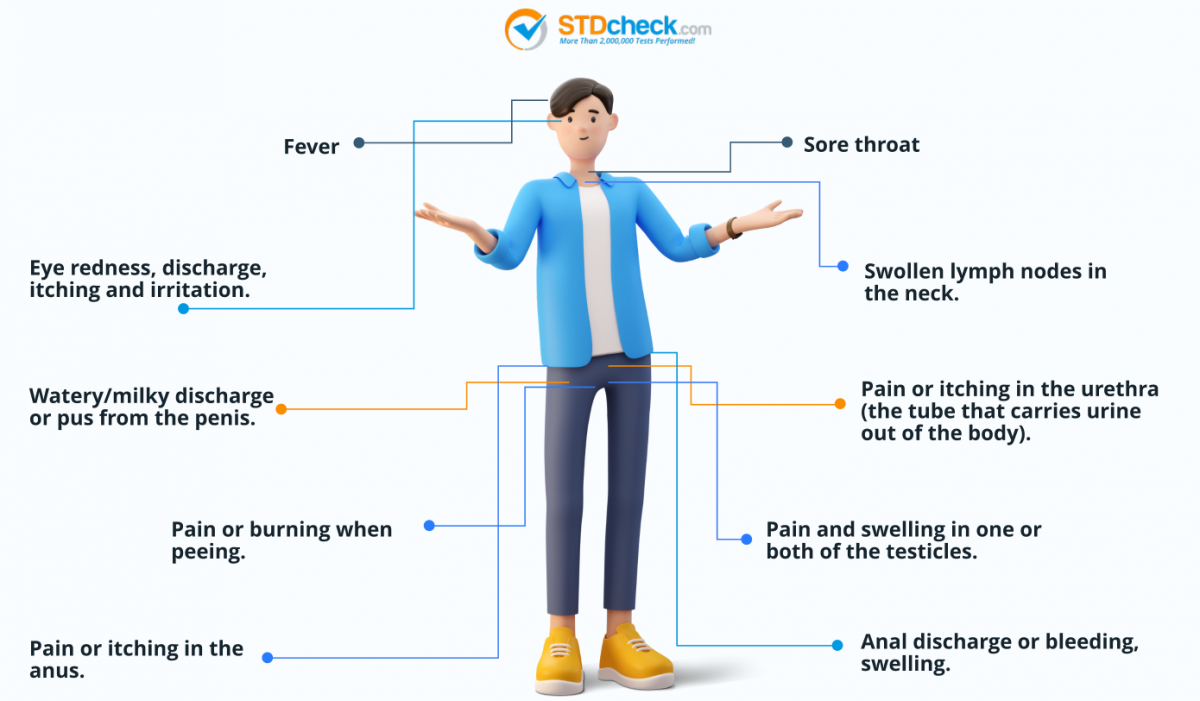Chlamydia Symptoms
On This Page: Chlamydia Symptoms | Symptoms in Women | Symptoms in Men | Chlamydia Throat, Anus & Eye | Complications
Chlamydia is a common bacterial sexually transmitted infection that is spread through oral, vaginal, and anal sex. Although most people don’t show symptoms, left untreated, chlamydia can damage the reproductive system, making it hard to have children.
At least 50% of the time, chlamydia has no symptoms in men and women which contributes to the disease being extremely common and easily spread. It can be easily cured with antibiotics; get tested today if you think you may have been exposed.
or call 1-800-456-2323 or start a Live Chat
Signs of Chlamydia
Most people with chlamydia don’t know they have it. A hefty 75% of infected women and 50% of infected men experience no signs.1 The silent nature of chlamydia is part of the reason why it’s so common.
If chlamydia symptoms do occur, they typically appear between 1-3 weeks after infection.2 Signs of chlamydia can be so mild that people don’t realize them or mistake them for something else.
If you notice symptoms of chlamydia or think you may have been exposed, it’s important to get chlamydia tested.
Chlamydia Symptoms in Women

Most infected women do not experience symptoms.
Chlamydia symptoms in women can include:
- Yellow vaginal discharge
- Vaginal swelling
- Pain during sex
- Pain or burning when peeing
- Frequent urge to pee
- Bleeding between periods or after sex
- Pain during sex
Chlamydia Symptoms in Men
When symptoms do occur in men, they may include a thick, yellow-white, milky or watery discharge from the penis and/or a burning sensation during urination. Pain and swelling in the testes may also occur, although such symptoms are less common. It is more common for men to experience symptoms. However, many do not.

Chlamydia symptoms in men can include:
- Watery/milky discharge or pus from the penis
- Pain or burning when peeing
- Pain or itching in the urethra (the tube that carries urine out of the body)
- Pain and swelling in one or both of the testicles
Symptoms in the Throat, Anus, and Eye
Both men and women can get chlamydia in the throat from oral sex, or the anus from anal sex with an infected partner. Most of the time, these conditions do not cause any symptoms.
Though less common, people can get chlamydia in the eye when infected semen, pre-cum, or vaginal secretions come into contact with the eye. This can happen during direct content or by rubbing your eye without washing your hands.
Signs of chlamydia in the throat can include:
- Sore throat
- Swollen lymph nodes in the neck
- Fever
- Redness in the throat
Signs of anal chlamydia can include:
- Pain or itching in the anus
- Anal discharge or bleeding
- Anal swelling
- Diarrhea
Signs of chlamydia in the eye can include:
- Redness
- Discharge
- Swollen eyelids
- Itching and irritation
If you or your sexual partner have any of these symptoms, you should stop having oral, vaginal, and anal sex until you can get tested and find out what’s going on. Visit your doctor or get tested at a local std testing center.
Chlamydia Complications
If you don’t seek treatment to clear chlamydia, it may lead to long-term and serious health problems, even if you are not experiencing symptoms. Also, if someone with a chlamydia infection has sex with a partner who has HIV, the inflammation caused by chlamydia can increase the risk of contracting HIV.3
Untreated Chlamydia Symptoms in Women
In women, untreated chlamydia can spread from the cervix (the passageway from the vagina to the uterus) up to the urethra (urine canal), the uterus (womb), and fallopian tubes (the passageway that carries eggs from the ovaries to the uterus). This can lead to pelvic inflammatory disease (PID), damaging the tissue of the reproductive organs. PID may cause chronic pelvic pain, dangerous ectopic pregnancy, or infertility.4
Complications During Pregnancy
If you’re a pregnant woman with chlamydia, you can pass the infection to your baby during delivery. This can cause eye infections and pneumonia and make you more likely to give birth too early. This is why the Centers for Disease Control and Prevention (CDC) recommends getting tested for chlamydia early on in your pregnancy, especially if you are someone who is at risk.5
Untreated Chlamydia Symptoms in Men
In men, untreated chlamydia can lead to urethral scarring and infection, swollen and tender testicles, prostatitis, and male sterility. Chlamydia can cause nongonococcal urethritis (NGU), an infection of the urethra, as well as epididymitis, an infection of the epididymis (the tube that carries sperm from the testes).
Reactive Arthritis
Reactive arthritis is a painful form of inflammatory arthritis that can occur in reaction to certain bacterial infections, including chlamydial infection. It can cause pain and swelling of certain joints, often the knees and/or ankles, as well as the heels, toes, or fingers. It may also cause persistent lower back pain. If you develop arthritis within a month of chlamydia infection, you should see a health care provider, like a rheumatologist, to determine the best course of treatment.6
What Can You Do?
To prevent chlamydia from progressing and causing complications, get tested for chlamydia to know for sure if you have it. Regularly testing for sexually transmitted diseases is a normal and important part of being responsible and protecting your health while being sexually active, so there’s no need to be worried or ashamed about getting tested or diagnosed. Chlamydia is very common and easily curable with a prescribed course of antibiotics.
Trusted Review
Innerbody Research – a science-based site that reviews home health products – gave us a rating of 8.2 out of 10 for our accuracy and the level of privacy we provide for our customers. Unfortunately, we did not get a perfect 10 because we are not compatible with any health insurance. In order to keep your health private we choose not to work with health insurance, otherwise they may be able to know any diagnosis or test result you receive. If you are curious about your health or have a concern about symptoms you may be experiencing, then call our customer care center at 1-800-456-2323 to find options available to you.
- “Chlamydia - Women’s Health Guide.” U.S. Department of Veterans Affairs. https://www.publichealth.va.gov/infectiondontpassiton/womens-health-guide/stds/chlamydia.asp
- “Symptoms - Chlamydia.” National Health Service U.K. https://www.nhs.uk/conditions/chlamydia/symptoms/
- "STDs and HIV - CDC Fact Sheet." Centers for Disease Control and Prevention. https://www.cdc.gov/std/hiv/stdfact-std-hiv-detailed.htm
- “Pelvic Inflammatory Disease.” Centers for Disease Control and Prevention. https://www.cdc.gov/std/pid/stdfact-pid.htm
- “Chlamydia - CDC Fact Sheet.” Centers for Disease Control and Prevention. https://www.cdc.gov/std/chlamydia/stdfact-chlamydia.htm
- “Reactive Arthritis.” American College of Rheumatology. https://www.rheumatology.org/I-Am-A/Patient-Caregiver/Diseases-Conditions/Reactive-Arthritis
Medically Reviewed by Julie Hutchinson, MD on March 28, 2022
Written by Esther Jordan on January 24, 2020
Fast, Private & Affordable
Our panels are carefully designed by our physicians to provide you with complete peace
of mind.
What should I get tested for?
Find out what test is right for you using our personalized Test Recommender.




